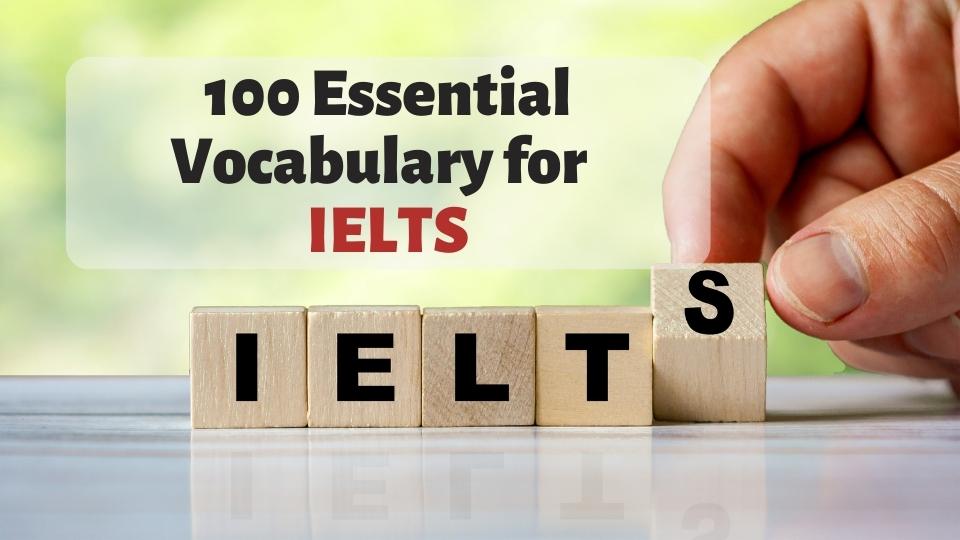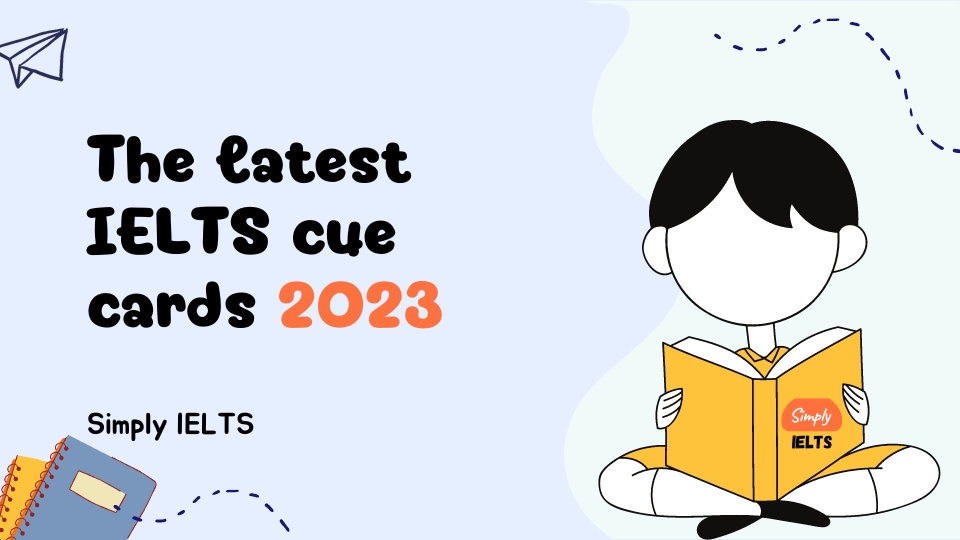Ace the IELTS: 100 Essential Vocabulary for IELTS to Boost Your Score!

Are you struggling to improve your vocabulary for IELTS exam? Look no further! We’ve compiled a comprehensive list of the top 100 essential IELTS vocabulary words, complete with definitions and examples to help you ace the exam. From “abstemious” to “zest,” this list has everything you need to expand your vocabulary and impress the examiners. So grab a pencil and a notebook, and let’s get studying!

How to study vocabulary for IELTS?
To effectively study vocabulary for the IELTS exam, here are a few tips to keep in mind:
- Make a list of the words you need to learn and review them regularly. Repetition is key when it comes to memorization, so be sure to review your list regularly until the words become second nature to you.
- Use flashcards to help with memorization. Write the word on one side of the card and the definition on the other. You can also include an example sentence to help you understand how the word is used in context.
- Practice using the words in sentences. One of the best ways to learn a new word is to use it in a sentence. This will help you understand how the word functions in language and will also help you remember it better.
- Take practice tests and pay attention to the vocabulary used. As you take practice tests, pay attention to the vocabulary being used in the questions and practice using those words in your own writing and speaking.
- Use online resources to help with learning. There are many online tools and resources available to help you learn new vocabulary, including vocabulary games and quizzes. These can be a fun and engaging way to study and reinforce your learning.
By following these tips and incorporating them into your study routine, you’ll be well on your way to mastering the vocabulary needed to succeed on the IELTS exam.
Synonyms and Antonyms in IELTS exam
Synonyms and antonyms are words that have similar or opposite meanings, respectively. They can be a useful tool to vary your vocabulary and make your writing and speaking more interesting and effective.
To use synonyms effectively, it’s important to consider the context in which the word is being used and choose the synonym that best fits. For example, if you are writing about a happy event, you might use the synonym “joyful” instead of the word “happy.” It’s also important to avoid using too many synonyms for the same word, as this can make your writing repetitive and confusing for the reader.
Antonyms, on the other hand, can be used to contrast ideas or to emphasize a point. For example, if you are writing about the importance of physical exercise, you might use the antonym “inactive” to contrast with the idea of being physically active.
When using synonyms and antonyms in your writing and speaking for the IELTS exam, it’s important to choose words that are appropriate for the level of formality and academic language expected.
It’s also a good idea to familiarize yourself with the meanings of these words and to practice using them in context. By doing so, you’ll be able to effectively expand your vocabulary and impress the examiners.
Different types of language and vocabulary used on the IELTS exam
The IELTS exam tests your ability to use language effectively in a variety of contexts, including formal, informal, and academic settings. It’s important to understand the differences between these types of language and to know when to use them appropriately.
Formal language is used in more formal or professional settings, such as business meetings or academic writing. It is characterized by:
- The use of more formal vocabulary
- Complex sentence structures
- Proper grammar
Informal language, on the other hand, is used in casual or friendly settings, such as conversations with friends or in casual writing. It is characterized by:
- The use of slang
- Contractions
- Less formal vocabulary
Academic language is used in academic settings, such as university lectures or research papers. It is characterized by:
- The use of technical terms
- Jargon specific to a particular field of study
On the IELTS exam, you will be expected to use all three types of language depending on the task.
For example, in the writing section, you may be asked to write a formal letter or an academic essay, while in the speaking section, you may be asked to have a casual conversation with the examiner.
It’s important to understand the differences between these types of language and to use them appropriately to demonstrate your language skills and improve your chances of success on the exam.
Top 100 Vocabulary for IELTS
Here is a list of common IELTS vocabulary words and their meanings to help you prepare for the test
| Word | Meaning |
|---|---|
| Abolish | To do away with |
| Adjudicate | To make a decision or judgment about something |
| Adverse | Harmful or unfavorable |
| Aggregate | The total amount or number of something |
| Alleviate | To make something less severe or painful |
| Ameliorate | To make something better or more tolerable |
| Amorphous | Without a specific shape or form |
| Arduous | Difficult or demanding a lot of effort |
| Articulate | Clearly and effectively expressed |
| Aspire | To have a strong desire or ambition to do or achieve something |
| Atrophy | To waste away or decrease in size or strength |
| Attenuate | To weaken or reduce in intensity |
| Austerity | The quality or state of being strict or severe |
| Bland | Lacking in flavor or excitement |
| Bombastic | Using complex words in a pompous or pretentious way |
| Bombast | Pretentious or pompous speech or writing |
| Boorish | Rude or ill-mannered |
| Buxom | Plump and healthy-looking, often used to describe a woman |
| Capricious | Changeable or unpredictable, especially in mood or behavior |
| Carnal | Relating to the physical or bodily desires or pleasures |
| Castigate | To criticize or punish severely |
| Caustic | Capable of burning or corroding |
| Cautious | Careful or wary, especially in order to avoid danger or risk |
| Cerebral | Relating to the intellect or the brain |
| Chicanery | Deception or trickery |
| Coalesce | To come together or unite to form a single entity |
| Cognizant | Being aware or informed of something |
| Complementary | Something that enhances or improves something else |
| Complaisant | Willing to please or comply with others |
| Compunction | A feeling of guilt or remorse for doing something wrong |
| Conciliatory | Tending to reconcile or make peace |
| Concomitant | Accompanying or occurring at the same time as something else |
| Condone | To forgive or overlook an offense or fault |
| Congenial | Favorable or suitable, often used to describe a person’s personality or environment |
| Conjugal | Relating to marriage or the relationship between a husband and wife |
| Connive | To secretly plot or scheme, often with a dishonest or malicious intent |
| Conspicuous | Noticeable or easy to see |
| Consternation | A feeling of anxiety or dismay |
| Contemptuous | Showing or feeling scorn or disrespect |
| Contrite | Feeling remorse or regret for a wrong committed |
| Conventional | Following or based on accepted standards or norms |
| Covetous | Greedy or envious |
| Cower | To shrink back or crouch in fear or submission |
| Cumbersome | Difficult to handle or manage, often because of being large or heavy |
| Dearth | A lack or scarcity of something |
| Debacle | A complete failure or disaster |
| Debauchery | Indulgence in or inclination for sensual pleasure or excess |
| Vocabulary | Meaning |
|---|---|
| Deference | Respect or reverence shown to someone or something |
| Deign | To consider something beneath one’s dignity or worth |
| Demagogue | A leader who seeks support by appealing to popular desires and prejudices |
| Demur | To express doubt or hesitation |
| Denigrate | To speak badly of or criticize unfairly |
| Deride | To speak or write about with contempt or ridicule |
| Desiccate | To dry out completely |
| Desuetude | Disuse or inactivity |
| Desultory | Lacking in purpose or consistency |
| Deviate | To depart from an established course or norm |
| Dilate | To make something wider or larger |
| Dilatory | Tending to delay or procrastinate |
| Disabuse | To set right or correct a mistake or misunderstanding |
| Discern | To perceive or recognize something, often with insight or understanding |
| Disconcert | To disturb or upset the composure of |
| Discursive | Wandering from one topic to another |
| Disenfranchise | To deprive someone of a right or privilege |
| Disparage | To speak of or think of as being of little worth or value |
| Dispirit | To cause to lose hope or enthusiasm |
| Dissent | To disagree or hold a different opinion |
| Dissuade | To persuade someone not to do something |
| Dither | To hesitate or be indecisive |
| Diversionary | Intended to distract or divert attention |
| Diverse | Varied or different |
| Dogmatic | Unwilling to consider other viewpoints or alternatives |
| Ebullient | Cheerful and full of enthusiasm |
| Echelon | A level or rank within an organization or society |
| Effervescent | Bubbly or lively |
| Egocentric | Focused on one’s own interests or desires |
| Emollient | Something that soothes or softens |
| Empirical | Based on observation or experimentation |
| Enervate | To weaken or tire out |
| Engender | To cause or bring about |
| Enigma | A puzzle or mystery |
| Enunciate | To pronounce or articulate clearly |
| Ephemeral | Short-lived or fleeting |
| Equanimity | Calmness or composure, especially in difficult situations |
| Equivocate | To use ambiguous or unclear language in order to deceive or mislead |
| Erudite | Scholarly or learned |
| Esoteric | Intended for or likely to be understood by only a small number of people with a specialized knowledge or interest |
| Evanescent | Likely to disappear or fade away quickly |
| Evocative | Tending to call to mind or suggest something |
| Exacerbate | To make something worse or more severe |
| Exemplar | A model or example to be followed or imitated |
| Exigent | Urgent or pressing |
| Expurgate | To remove or censor offensive or inappropriate parts |
| Extemporaneous | Done or spoken without prior preparation |
| Extol | To praise or glorify highly |
| Fastidious | Very attentive to detail or correctness |
| Fecund | Capable of producing offspring or new growth |
| Fervent | Intense or passionate |
| Flout | To disrespect or disregard a rule or standard |
| Fortitude | Courage or strength of mind in facing adversity |
| Word | Meaning |
|---|---|
| Garrulous | Talkative, especially in a tedious or rambling way |
| Goad | To incite or encourage someone to do something |
| Grandiose | Impressive or elaborate, often in an excessive or pompous way |
| Gregarious | Outgoing and sociable |
| Halcyon | Calm and peaceful |
| Harangue | A long, aggressive speech |
| Heinous | Extremely wicked or cruel |
| Hierarchy | A system of ranking or organization |
| Hyperbole | Extreme exaggeration |
| Iconoclast | Someone who challenges or attacks traditional beliefs or institutions |
| Idiosyncrasy | A peculiar habit or characteristic |
| Imbue | To infuse or fill with a quality or emotion |
| Immutable | Unable to be changed or altered |
| Impassive | Showing no emotion or response |
| Impecunious | Lacking in funds or financial resources |
| Imperturbable | Unable to be disturbed or upset |
| Impervious | Unable to be affected or penetrated |
| Impinge | To have an impact or influence on something |
| Implacable | Unyielding or stubborn |
| Implicit | Implied or understood without being directly stated |
| Impudent | Disrespectful or insolent |
| Inchoate | Incomplete or rudimentary |
| Incongruous | Inconsistent or incompatible with something else |
| Indeterminate | Unable to be determined or resolved |
| Indolent | Lazy or unwilling to work |
| Inert | Lacking in energy or activity |
| Infelicitous | Unfortunate or inappropriate |
| Ingenuous | Honest and naive |
| Inimical | Harmful or damaging |
| Innocuous | Harmless or benign |
| Insidious | Sneaky or subtle in a harmful way |
| Intractable | Difficult to manage or control |
| Intransigent | Unwilling to compromise or change |
| Inure | To become accustomed or toughened to something |
| Inveigh | To speak out strongly against something |
| Inveterate | Deep-seated or long-standing |
| Irascible | Easily angered or irritable |
| Irresolute | Unable to make a decision or take action |
| Itinerant | Travelling from place to place, often for work |
| Jocular | Playfully humorous |
| Juxtapose | To place side by side, often for comparison or contrast |
| Laconic | Using very few words, especially in speech |
| Languid | Lacking in energy or vitality |
| Lassitude | A feeling of weariness or exhaustion |
| Loathe | To strongly dislike or detest something |
| Loquacious | Talkative or chatty |
| Ludicrous | Absurd or ridiculous |
| Malleable | Capable of being shaped or formed |
| Maverick | Someone who does not conform to the norms or expectations of their group |
| Melancholy | A feeling of sadness or depression |
| Meretricious | Superficial or insincere |
| Misapprehension | A misunderstanding or incorrect belief |
| Misconstrue | To interpret wrongly or incorrectly |
| Mitigate | To make something less severe or harmful |
| Mollify | To soothe or pacify |
More IELTS vocabulary
| Word | Meaning |
|---|---|
| Nefarious | Wicked or evil |
| Nemesis | A person or thing that is a source of harm or defeat |
| Nonplussed | Surprised or puzzled |
| Obdurate | Unyielding or stubborn |
| Obsequious | Overly eager to please or obey |
| Obviate | To make unnecessary or to prevent |
| Onerous | Burdensome or oppressive |
| Opaque | Not transparent or easily understood |
| Opprobrium | Disgrace or shame |
| Oracular | Mysterious or obscure, as if spoken by a prophet |
| Pacify | To calm or bring peace to |
| Palatable | Acceptable or pleasing |
| Palliate | To make something less severe or painful |
| Paragon | A model of excellence or perfection |
| Paregoric | Calming or soothing |
| Peccadillo | A minor fault or wrongdoing |
| Pedagogue | A teacher, especially one who is overly strict or didactic |
| Pejorative | Disparaging or derogatory |
| Penultimate | Next to the last |
| Perfidious | Dishonest or untrustworthy |
| Perfunctory | Done in a routine or careless way |
| Permeate | To spread or penetrate throughout |
| Persiflage | Light or playful banter |
| Persnickety | Fussy or finicky |
| Peruse | To read or examine carefully |
| Petulant | Irritable or peevish |
| Philanthropy | A desire to help others, especially through charitable giving |
| Pine | To long for or yearn for something |
| Placate | To pacify or calm |
| Plaudit | An expression of praise or admiration |
| Plethora | An excess or abundance of something |
| Poignant | Deeply moving or touching |
| Ponderous | Heavy or burdensome |
| Pragmatic | Practical or matter-of-fact |
| Precarious | Uncertain or insecure |
| Predecessor | Someone who held a position or job before another person |
| Preempt | To take the place of or prevent something from happening |
| Preemptive | Done in advance in order to prevent something from happening |
| Presage | To be a warning or sign of something to come |
| Pretentious | Claiming or pretending to be more important or talented than is warranted |
| Proclivity | A natural tendency or inclination |
| Profligate | Wasteful or extravagant |
| Promulgate | To make known or public, often through formal announcement or declaration |
| Proscribe | To forbid or prohibit something |
| Pusillanimous | Cowardly or timid |
| Quaff | To drink deeply or heartily |
| Quail | To shrink back in fear or cowardice |
| Quandary | A state of uncertainty or confusion |
| Quaver | To tremble or shake |
| Querulous | Inclined to complain or whine |
| Quiescent | Inactive or at rest |
| Quirk | A peculiar or unusual characteristic |
| Rack | To cause great suffering or torment |
| Rampant | Uncontrolled or unchecked |
| Rarefy | To make something thin or less dense |
| Rapt | Filled with wonder or delight |
| Rebuke | To reprimand or criticize sharply |
Here are more common IELTS vocabulary words and their meanings:
| Word | Meaning |
|---|---|
| Recant | To withdraw or take back a statement or belief |
| Recluse | A person who lives in solitude or seclusion |
| Recondite | Deeply learned or obscure |
| Redolent | Having a strong and pleasant smell |
| Refractory | Difficult to control or manage |
| Renounce | To give up or disown something |
| Repudiate | To reject or refuse to accept something |
| Rescind | To cancel or revoke something |
| Resignation | Acceptance of something undesirable but inevitable |
| Resilient | Able to bounce back or recover quickly from difficult situations |
| Resolve | To make a firm decision to do something |
| Restive | Restless or impatient |
| Reticent | Reserved or reluctant to speak or express oneself |
| Rife | Prevalent or common |
| Ruminative | Thinking deeply or meditating on something |
| Sagacious | Wise or having good judgment |
| Salubrious | Healthful or beneficial |
| Sanctimonious | Pretending to be holy or virtuous |
| Sanguine | Optimistic or hopeful |
| Sate | To satisfy fully or to the point of excess |
| Satiate | To satisfy fully or to the point of excess |
| Saturnine | Gloomy or sullen |
| Scrupulous | Careful and thorough in observing rules or principles |
| Sinecure | A position that requires little or no work but provides a salary or other benefits |
| Skeptical | Doubtful or questioning |
| Solecism | A linguistic mistake or error |
| Solicitous | Concerned or attentive to someone’s needs or welfare |
| Somnolent | Drowsy or sleepy |
| Sotto voce | In a low voice, especially to avoid being overheard |
| Sparse | Scanty or thin |
| Specious | Deceptively attractive or seemingly true but actually false |
| Spurious | False or counterfeit |
| Squander | To waste or spend extravagantly |
| Stall | To delay or hold back something |
| Static | Not changing or moving |
| Staunch | Loyal or committed |
| Stentorian | Very loud or booming |
| Stoic | Accepting something without complaint or emotion |
| Stultify | To render someone or something ineffective or useless |
| Sublime | Exalted or grand in a way that inspires awe or admiration |
| Subpoena | A court order requiring someone to appear in court as a witness |
| Succinct | Concise or brief |
| Succor | Assistance or relief in times of hardship or distress |
| Superfluous | More than is necessary or required |
| Superlative | Excellent or outstanding |
| Supplant | To replace or take the place of something or someone |
| Surfeit | An excess or overabundance of something |
| Susurration | A whispering or rustling sound |
| Taciturn | Reserved or uncommunicative in speech |
| Tenacious | Persistent or stubborn |
| Tractable | Easily managed or controlled |
| Transcendent | Exceeding or surpassing normal limits |
| Transient | Lasting only for a short time |
| Trepidation | Anxiety or fear |
| Trite | Overused or banal |
more common IELTS vocabulary words and their meanings:
| Word | Meaning |
|---|---|
| Ubiquitous | Present or appearing everywhere at the same time |
| Unctuous | Oily or smooth in a way that is insincere or ingratiating |
| Unfeigned | Genuine or sincere |
| Upbraid | To scold or criticize sharply |
| Vapid | Lacking in liveliness or flavor |
| Vehement | Strong or forceful in expression or action |
| Velitation | A hesitation or indecision |
| Venal | Open to bribery or corruption |
| Verdant | Lush or green with vegetation |
| Vestige | A trace or remnant of something that once existed |
| Vex | To cause annoyance or frustration |
| Vexation | Annoyance or frustration |
| Vigor | Energy or vitality |
| Vilify | To speak badly of or defame |
| Vilipend | To treat as unworthy or insignificant |
| Vindicate | To clear from blame or suspicion |
| Visceral | Relating to deep inner feelings or emotions |
| Vitriolic | Bitter or venomous in language or tone |
| Voluble | Talkative or chatty |
| Voracious | Having a very strong desire or appetite, especially for something |
| Waver | To be uncertain or indecisive |
| Whimsical | Playfully or fancifully odd |
| Wily | Clever or cunning, especially in a deceptive way |
| Xenophobia | Fear or hatred of strangers or foreign things |
| Yoke | A bond or restraint |
| Zephyr | A gentle or soft breeze |
| Zest | Enthusiasm or excitement |
Conclusion
In conclusion, mastering the vocabulary on the IELTS exam is essential to achieving a high score.
With the help of our comprehensive list of the top 100 essential IELTS vocabulary words, complete with definitions and examples, you now have the tools to expand your vocabulary and impress the examiners.
Remember to regularly review the words, use flashcards, practice using the words in sentences, take practice tests and pay attention to the vocabulary used and use online resources.
With dedication and practice, you’ll be able to master the vocabulary needed to succeed on the IELTS exam.
So, don’t wait, start studying today and take your IELTS exam with confidence!







Responses